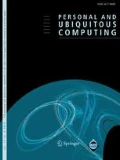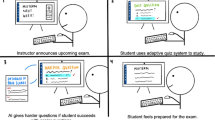Abstract
As the online education market grows steadily, video lecture–based online educational environments such as the massive open online course (MOOC), open courseware (OCW), and flipped classroom are being used diversely in informal as well as formal education. However, since the learning in the online educational environment is predominantly conducted by the learners themselves, problems such as low motivation, low concentration, and low completion rates have been identified. For this paper, we developed a game-based assessment tool that can enhance the learning motivation and concentration and automatically determine if the learning without mind-wandering has been completed; accordingly, we applied it in university classes as part of a verification experiment to investigate the educational usability. The experiment results showed that the game-based assessment tool positively impacted the learning motivation and reduced the learning burden; besides, all of the subjects could enjoy both parts of the game-based assessment tool regardless of his/her learning ability. Finally, a sufficiently high potential was identified regarding the educational usability of the game-based assessment tool.


Similar content being viewed by others
References
Dai HM, Teo T, Rappa NA (2020) Understanding continuance intention among MOOC participants: the role of habit and MOOC performance. Comput Human Behavior 112
Friedman T (2013) Revolution hits the universities. New York Times 26(1)
Littenberg-Tobias J, Reich J (2020) Evaluating access, quality, and equity in online learning: a case study of a MOOC-based blended professional degree program. Internet Higher Educ 47
Sallam MH, Martín-Monje E, Li Y (2020) Research trends in language MOOC studies: a systematic review of the published literature (2012–2018). Comput Assist Lang Learn:1–28
Goopio J, Cheung C (2020) The MOOC dropout phenomenon and retention strategies. J Teach Travel Tour:1–21
Bruner IIGC, Kumar A (2005) Applying TAM to consumer usage of handheld Internet devices. J Bus Res 58(5):553–558
Igbaria M, Parasuraman S, Baroudi JJ (1996) A motivational model of microcomputer usage. J Manag Inf Syst 13(1):127–143
Choi M-s (2011) A study on the influence of factors such as personal innovativeness, social influence and user interface on smart phone acceptance: based on an expanded technology acceptance model. The Graduate School of Ewha Womans University
Davis FD (1989) Perceived usefulness, perceived ease of use, and user acceptance of information technology. MIS Q 319–340
In-Jun H, Seong-Il L (2010) The study of knowing the intention to adopt smartphone by extending Technology Acceptance Model. Paper presented at the Korean Institute of Industrial Engineers 2010 Conference
Kim S-H (2010) Effects of perceived attributes on the purchase intention of smart-phone. J Korea Contents Assoc 10(9):318–326
Lee YI (2010) A study on the smart-phone TAM and satisfaction of college students. J Korea Res Acad Distrib Manag 13(5):93–110
Lin C-C (2013) Exploring the relationship between technology acceptance model and usability test. Inf Technol Manag 14(3):243–255
Kim HJ, Jung CH (2008) The impacts of commodity and user characteristics on customersʼ intention to reuse in mobile banking services. J Bus Educ 21:215–246
Suh C-K, Seong S-J (2004) Individual characteristics affecting user’s intention to use internet shopping mall. Asia Pac J Inf Syst 14
Wang J, Senecal S (2007) Measuring perceived website usability. J Internet Commer 6(4):97–112
Dietz J (1997) Satisfaction: a behavioral perspective on the consumer. J Consum Mark 14:401–404
Lee YN, Lee LY, Park HH, Park SH (2007) The study on brand image by relationship quality (satisfaction, trust, commitment) of family restaurants effects on brand loyalty: focusing on customers at their twenties. J Korea Hotel Resort Assoc 6(2):221–238
Oliver RL (2014) Satisfaction: a behavioral perspective on the consumer. Routledge
Lawshe CH (1975) A quantitative approach to content validity. Pers Psychol 28(4):563–575
Wilson FR, Pan W, Schumsky DA (2012) Recalculation of the critical values for Lawshe’s content validity ratio. Meas Eval Couns Dev 45(3):197–210
Morgan DL (1996) Focus groups as qualitative research, vol 16. Sage publications
Richardson CA, Rabiee F (2001) A question of access: an exploration of the factors that influence the health of young males aged 15 to 19 living in Corby and their use of health care services. Health Educ J 60(1):3–16
Seggern V, Marilyn Y, Nancy J (2003) The focus group method in libraries: issues relating to process and data analysis. Ref Serv Rev 31(3):272–284
Krueger RA, Casey MA (2014) Focus groups: a practical guide for applied research. Sage publications
Spencer LM, Spencer Y, Spencer S (2011) Competence at work. Models for superior performance. John Wiley & Sons, New York
Funding
This research was supported by Basic Science Research Program through the National Research Foundation of Korea (NRF) funded by the Ministry of Education (2018R1D1A1B07051369).
Author information
Authors and Affiliations
Corresponding author
Ethics declarations
Conflict of interest
The authors declare that they have no conflicts of interest.
Additional information
We certify that the submission is original work and is not under review at any other publication.
Publisher’s note
Springer Nature remains neutral with regard to jurisdictional claims in published maps and institutional affiliations.
Rights and permissions
About this article
Cite this article
Jo, J., Yi, E., Yang, Y. et al. Game-based assessment tool using convergence of gamification and motivation theory in intelligent tutoring system. Pers Ubiquit Comput 27, 1149–1159 (2023). https://doi.org/10.1007/s00779-021-01523-6
Received:
Accepted:
Published:
Issue Date:
DOI: https://doi.org/10.1007/s00779-021-01523-6




